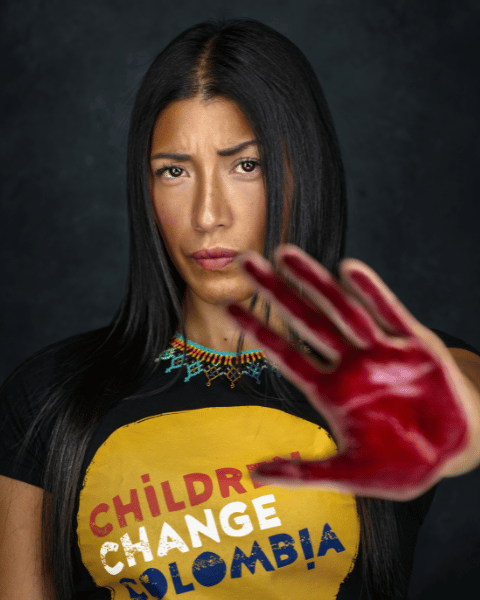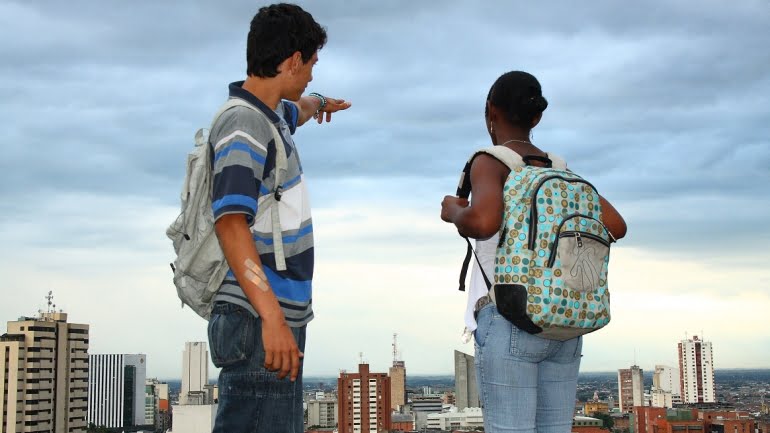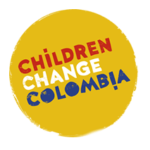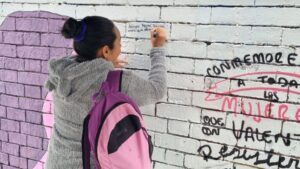Pasante de Comunicación y Outreach
Read MoreRed Hand Day: Ending the Recruitment and Use of Children in Armed Conflict
Written by Laura Field
While many children around the world enjoy running through the playground and giggling with their friends, elsewhere thousands of boys and girls are being torn from their families and forcibly recruited into armed conflict. The recruitment and use of children by armed forces is still a serious issue affecting children in 14 countries ranging from Colombia to Somalia and Afghanistan.
Every year the 12th February marks Red Hand Day, the campaign dedicated to ending the recruitment and use of children in armed conflict. On Red Hand Day, pleas are made to political leaders and influential figures all over the world to stop boys and girls from being recruited by armed forces.
Red Hand Day to Free Children From Armed Conflicts
The Red Hand Day demands include:
- Straight 18: No child under the age of 18 may be used or trained in armies, armed groups or other military units.
- Those responsible for forcing children into armed conflict must be punished.
- Children formerly forced into armed conflict must be cared for, protected and offered political asylum.
- The expansion of financial support for aid programmes to benefit girls and boys who have been victims of forced recruitment.
- The exporting of arms must come to an end.
- Peace education must be promoted and expanded.
According to UNICEF, more than 93,000 children were verified as recruited and used by groups related to armed conflicts between 2005 and 2020. However, it is believed that the actual number of children falling victim to forced recruitment is in reality much higher. The ways girls and boys can be forced into armed conflict range from direct abduction to threats, coercion, or manipulation by armed individuals and groups.
Red Hand Day also raises awareness of the fact that children recruited by armed forces don’t necessarily become fighters themselves. They can also be used as spies, informants, looters, messengers, and domestic or sexual slaves. They can be exposed to traumatic events such as violence, torture and killing. These have lasting and deeply damaging psychological effects often requiring lifelong psychosocial support.

Diana Bermudez, photographed by Tim Macklin
According to UNICEF, more than 93,000 children were verified as recruited and used by groups related to armed conflicts between 2005 and 2020. However, it is believed that the actual number of children falling victim to forced recruitment is in reality much higher. The ways girls and boys can be forced into armed conflict range from direct abduction to threats, coercion, or manipulation by armed individuals and groups.
Red Hand Day also raises awareness of the fact that children recruited by armed forces don’t necessarily become fighters themselves. They can also be used as spies, informants, looters, messengers, and domestic or sexual slaves. They can be exposed to traumatic events such as violence, torture and killing. These have lasting and deeply damaging psychological effects often requiring lifelong psychosocial support.

Children Recruited by Armed Forces in a Colombian Context
The recruitment and use of children by armed forces is still prevalent in Colombia. Between 1990 and 2017, 16,238 girls and boys were forcibly recruited and an estimated 16,000 children were killed in conflict during this time. According to the Childhood and Armed Conflict Observatory (ONCA in Spanish) in the first semester of 2022, 85 children were forcibly recruited in Colombia.
These numbers likely don’t reflect the full extent of forced child recruitment by armed forces since many cases go undocumented. Not only tragic in terms of the physical harm and psychological trauma that these children suffer, forced recruitment by armed forces means that many Colombians never get to enjoy the biodiversity of the lands where they’re born.
The recruitment and use of children by armed forces obliterates childhoods, tears families apart, and inflicts an immense amount of harm on society by exposing young boys and girls to traumatic events that no human should ever have to experience at any age.
How is Children Change Colombia combatting the recruitment of children by armed forces?
In terms of tackling the specific issue of forced recruitment into armed conflict, CCC launched a new project in July 2022. We partnered with organisations Tiempo de Juego (TDJ), Centre for Restoration and Child Care (CRAN).
This 3 year project provides a novel community-based narrative approach to psychosocial care, trauma and reintegration that supports 750 children and young people (CYP) at risk of joining gangs and formerly associated with armed groups to gain access to the resources and skills they need to deal with a variety of traumatic situations and stigmas. The purpose of this project is that CYP enhance positive bonds within the community and change situations of vulnerability and criminality through the use of narratives of resilience, creating protective and healing environments.
In addition, this year CCC has a new project ´Football for Peace´ that aims to support children through football, helping them connect with their peers and communities, giving them a sense of belonging, and teaching them to develop skills in critical thinking, empathy and managing emotions.
Located in the Pacific region of Colombia, the project will provide training to local sports coaches to teach children about peace-building, gender equality and to develop their social-emotional skills, with the aim of protecting them against forced recruitment. It will also raise funds to provide football kits and the restoration of football pitches. This project is implemented in partnership with the AfroColombian Consul ACADESAN.
Capacity building activities
Children Change Colombia has partnered with Action for Child Trauma International (ACTI) which trains and supports community members and NGO staff, giving them the skills to successfully treat children and young people traumatised by conflict, violence and disaster. With them we created an in-person workshop in Bogotá taught by instructors Pilu Rivas and Almudena García. CCC staff and 19 representatives from our partner organisations came together from several regions of Colombia including Quibdó, Cartagena, Santa Marta and La Guajira. ACTI also provided online training to civil servants from the Colombian Institute for Family Welfare (ICBF), with whom we have signed a technical cooperation agreement. The ICBF also gave a workshop to our partners on sexual and gender violence and how to report instances of this in Colombia.
Children should be free to play with their friends and enjoy the beauty of their natural surroundings without the fear of being abducted or forcibly recruited into armed conflict. We are committed to ending the recruitment and use of children in armed conflict to eliminate unnecessary trauma, promote peace and ensure that Colombia can thrive as a country that is safe for all children.

Almudena and Pilu, Trainers at Action for Child Trauma International
Why we do not use the term ‘child soldier’
- The term ‘child soldier’ invokes some misconceptions about what the role entails:
- ‘child soldier’ assumes that all children associated with armed groups are armed and fighting – many actually take on household chores, are used for sexual exploitation or for sending messages or spying
- it limits most people’s image of a child solider to boys – when in fact up to 40% of children associated with armed groups are girls
- most people think of child soldiers as only being an African phenomenon – it is thought that CAAGs are currently active in Afghanistan, Burma, Central African Republic, Chad, Colombia, DR Congo, India, Iraq, Philippines, Somalia, South Sudan, Sudan, Thailand and Yemen (Paris Principles on the Involvement of Children in Armed Conflict 2007).
‘A child associated with an armed force or armed group refers to any person below 18 years of age who is, or who has been, recruited or used by an armed force or armed group in any capacity, including but not limited to children, boys and girls, used as fighters, cooks, porters, spies or for sexual purposes’ (Paris Principles on the Involvement of Children in Armed Conflict 2007).
More News
Vacante: Profesor de Emprendimiento y Empleabilidad Santander
Responsabilidad principal del cargo: Desarrollar componente de emprendimiento y empleabilidad en colegios rurales a lo largo de la ruta del Cacao con énfasis en las oportunidades de la zona.
Read MoreVacante: Profesor (a) de Ingles Magdalena
Responsabilidad principal del cargo: Coordinar e implementar el desarrollo de clases de inglés complementarias para estudiantes de secundaria en colegios rurales, adaptando metodologías y materiales al contexto local para contribuir9 February 2023
Read MoreVacante: Profesor de Emprendimiento y Empleabilidad Magdalena
Responsabilidad principal del cargo: Desarrollar componentes de emprendimiento y empleabilidad en colegios rurales con énfasis en las oportunidades de la zona.
Read MoreVacante: Profesor(a) de Inglés Santander
Responsabilidad principal del cargo: Coordinar e implementar el desarrollo de clases de inglés complementarias para estudiantes de secundaria en colegios rurales, adaptando metodologías y materiales al contexto local para contribuir.9 February 2023
Read MoreCuando la IA cruza la línea: cómo las imágenes artificiales socavan el impacto real
En este artículo, exploramos el uso cada vez mayor de imágenes generadas por IA en el sector de la ayuda y el desarrollo. Si bien estas imágenes pueden ser impactantes,9 February 2023
Read More




